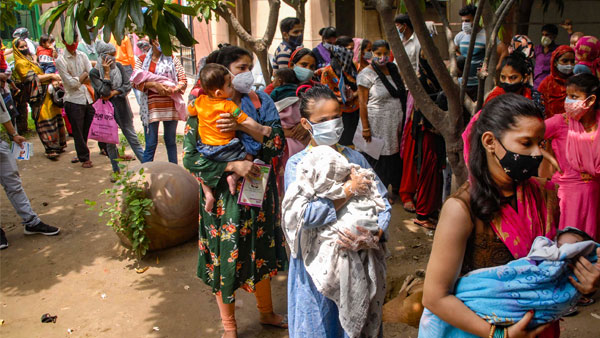
How India can beat covid 19 third wave? Lancet experts' 8-point prescription
New Delhi, June 18: 21 experts in Lancet including Biocon's Kiran Mazumdar Shaw and top surgeon Dr Devi Shetty have recommended eight actions to prepare for a possible resurgence of COVID-19 cases in India.

The Lancet medical journal, in its June 12 issue, proposed recommendations, meant to be undertaken by the central and state governments "to amplify and synthesise what must be done urgently." Let us have a look
One-size-fits-all approach
The organisation of essential health services must be decentralised. A one-size-fits-all approach is untenable since the numbers of Covid-19 cases and health services differ substantially from district to district. District-level working groups that have the autonomy to respond to rapidly changing local situations must be empowered to receive funds and resources to coordinate efforts across all sectors of the health system, from front-line workers to tertiary care.
Transparent national pricing policy
There must be a transparent national pricing policy and caps on the prices of all essential health services-eg, ambulances, oxygen, essential medicines, and hospital care. Hospital care should not require any out-of-pocket expenditure and costs should be covered by existing health insurance schemes for all people, as has been done in some states. All local governments must be allocated their grants as recommended by the Fifteenth Finance Commission8 to ensure they have the resources to augment COVID-19-related health services in their jurisdictions.
Evidence-based information on COVID-19 management
Clear, evidence-based information on the management of COVID-19 must be more widely disseminated and implemented. This information should include suitably adapted international guidelines for home care and treatment, primary care, and district hospital care in local languages that incorporate local circumstances and clinical practice. The guidance must also emphasise what not to do,10 and ensure that only evidence-based therapeutics are used. It should also provide information to help prevent increasingly concerning reports of other impacts of COVID-19, including secondary infections such as mucormycosis.
The information should also underline the essential non-COVID-19 health services that must remain fully accessible in specific facilities-eg, for tuberculosis, maternal and child health, and emergency medicine. Specific guidance should be offered by the central government on the appropriate use of Indian systems of medicine, especially for prevention and health promotion interventions, such as yoga. Additionally, widespread access to teleconsultation and care delivered by front-line workers needs to be expanded to reduce the burden on hospitals.
All human resources must be marshalled for the COVID-19 response
All available human resources across all sectors of the health system, including the private sector, must be marshalled for the COVID-19 response and adequately resourced, particularly with sufficient personal protective equipment, guidance on the use of clinical interventions, insurance, and mental health support. We support the implementation of the decision to deploy final-year medical students and AYUSH (ayurveda, yoga, naturopathy, unani, siddha, and homoeopathy) students in the COVID-19 response; this policy should be extended to nursing and paramedical students.
Centre-state coordination on vaccine price
Central systems to procure and distribute COVID-19 vaccines free of cost should be established in a departure from the current policy of decentralised procurement through state governments. State governments must decide on the priority groups for vaccination on the basis of evidence to optimise the use of available vaccine doses, which can be incrementally expanded as supplies improve.
Community engagement
Community engagement and public participation must lie at the heart of India's Covid-19 response. Active collaboration must be encouraged between government and civil society organisations to create and disseminate accurate information, enabling home-based care, emphasising prevention, helping navigate access to live-saving treatment, and promoting vaccination.
Transparency in government data collection
There must be transparency in government data collection and modelling to enable districts to proactively prepare for the likely caseloads in the coming weeks. Health system personnel require data on age and sex disaggregated Covid-19 cases, hospitalisations, and mortality rates; community-level coverage of vaccination; and community-based tracking of the effectiveness of Covid-19 treatment protocols and long-term outcomes.
Cash transfers
The suffering and risk to health caused by loss of livelihoods should be minimised by making provisions for cash transfers by the state to workers in India's vast informal economy who have lost their jobs, as is being done by some state governments. Formal sector employers must be required to retain all workers, irrespective of the status of contracts, through a government commitment to offer compensation to these companies when the economy revives. Lockdowns, if necessary, must be announced in advance.


 Click it and Unblock the Notifications
Click it and Unblock the Notifications

































